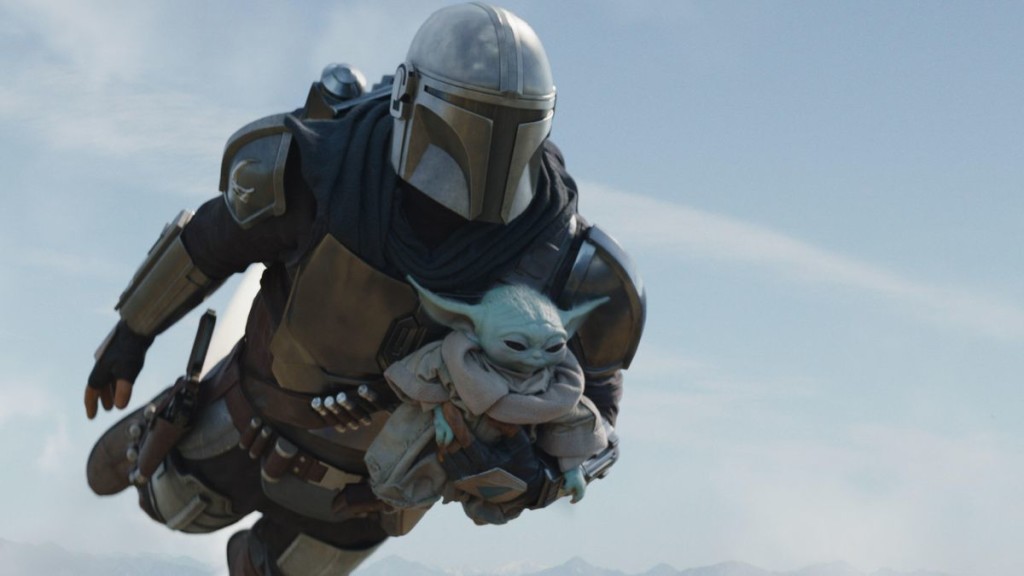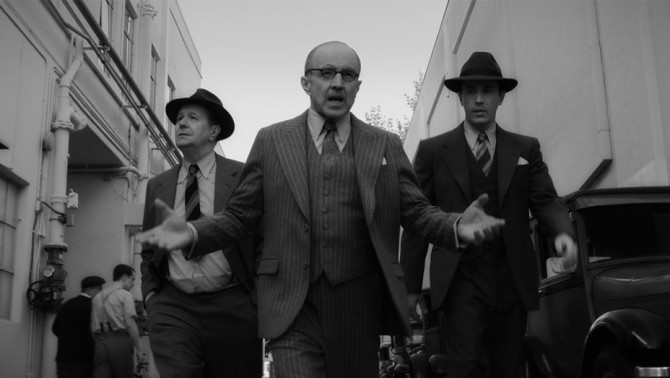Originally, I was going to do a “Mank” script-to-screen review but after spending an hour with the film and realizing Fincher hadn’t changed a word from the disastrous screenplay, that the review would’ve been a bloodletting and sent everyone into the week feeling miserable.
Conversely, my weekly Friday night whipping boy, The Mandalorian, had one of its best episodes. Which set up an interesting question. How is it that someone who is so good can make something so bad, while something so bad can manage an episode so good?
Let’s start with Mank.
I mean… I’m just going to say it. This movie was a disaster.
Now you may say, “But Carson! Look at the Rotten Tomato score! It’s high!” A couple of things. Critics love David Fincher. And rightly so. He’s one of our best directors, hands down. But for that reason, their default setting for every Fincher film is a thumbs up. I’m not sure they’d be able to give Fincher a negative review if they tried. Also, what critics are scoring here is not the movie as a whole. They’re scoring the direction. They love how Fincher has recreated a 1940s film to chronicle what is, arguably, the best movie ever made
But as a story?
AS A STORY!????
This is one of the worst scripts of the year.
With almost every bad script, lack of focus is a problem. And that’s exactly what I’m seeing here.
A good movie has a focused narrative. Somewhere in the first act – preferably as soon as possible – you explain to the audience what the problem is, which necessitates that your protagonist solve that problem. This creates the hero’s goal and the rest of the movie follows his struggle to achieve that goal.
In the recent hit film, The Invisible Man, the problem is that the heroine’s evil dead husband has found a way to come back to life and torture her. The goal, then, is to prove that this is happening then defeat him. You can break almost every good movie down into this formula.
The thing about Mank is that it PRETENDS to incorporate a problem, but it’s a sham. A lie. A misdirect. The movie starts with Mankiewicz being placed in a hotel room and told by a studio suit that he has 90 days to write the screenplay for Citizen Kane.
Except the movie then proceeds to COMPLETELY ABANDON THIS SETUP. The next 50 on-screen minutes contain scenes that literally have nothing to do with Mank’s pursuit of this goal. They are, rather, flashbacks of him hanging out on movie sets and in studios. And whenever we do manage to get back to that room, we get conversations between him and his typist that – how do I put this nicely – have nothing to do with fucking anything.
It takes until HALFWAY THROUGH THE MOVIE before we get a scene of our suit returning to Mank’s drab hotel and saying, “You only have 10 days left! And you haven’t even finished the first act!” Normally, an escalation like this would pump life into the movie. But everybody in Mank treats the goal with such a lack of importance that we don’t feel anything.
You’re only ever as good as a) your concept and b) your execution. If either of those things is weak, you cannot recover. I would argue that Mank is weak in both areas. I don’t even understand what the concept of Mank is! Mank needs to write Citizen Kane, which is followed by a movie that has nothing to do with Mank writing Citizen Kane? Anyway, this is how a great filmmaker can make a bad movie. Latch onto a concept that wasn’t any good in the first place and then abandon all pretense of a hero resolving a problem.
I mean the scenes in Mank are so aggressively disconnected from one another you must draw on an insane amount of concentration to keep track of what’s going on.
There was this scene where Mank and Marion are walking around the Hearst Castle babbling about the most inane things, and I thought to myself, “What is this scene about? How is it pushing the story forward? Where is the conflict? Why is it important that this scene exists?” It seems like all but a few scenes fail to answer these questions.
I remember one good scene in the entire first half. It’s the scene where Mank and his brother come to MGM and studio head Louis B. Mayer a) gives them a tour while explaining to them the rules that dictate MGM before b) making a speech to the entire MGM staff that he’s cutting their salaries by half.
Why does this scene work while all the others don’t? Because it incorporates the only two scenarios in the movie that we actually understand. We understand when someone gives someone else a tour of their domain and explains the rules of the house. We understand the concept of a man standing in front of his employees and having to give them bad news. For once in the movie, it was actually CLEAR what was going on.
I don’t have any clarity on why Mank and Marion are stumbling around Hearst’s house mumbling about shit that doesn’t have anything to do with the story.
The failure of Mank comes down to the ignorance of one simple reality – Decide what your movie is about or face the consequences.
Meanwhile, in a galaxy far far away, a certain show has decided that it actually wants to become entertaining again.
The problem with the Mandalorian is that it had eased into this relaxed storytelling style by which Mando was assigned some directive which he then had all the time in the world to achieve and, even if it didn’t work out, it wasn’t a big deal. In other words, each episode had a goal. But both the stakes and urgency regarding that goal were low.
This is why the latest episode of Baby Yoda, err, I mean Mandalorian, was so good. Directed by Robert Rodriquez, we got our first full GSU episode in Mandalorian history.
Goal – Protect Baby Yoda while he sits on the sacred rock to see if a Jedi teacher arrives.
Stakes – Losing Baby Yoda (Darth Gideon has arrived to kidnap him)
Urgency – The onslaught of storm troopers to retrieve Baby Yoda starts and never stops the whole episode.
That’s what stood out to me most about the episode. It contained an urgency that no other episode up until this point had. Remember, that’s what made the original two Star Wars movies so good. Urgency. Darth Vader relentlessly pursuing Luke Skywalker and the rest of the gang from the start of the movies to the finish.
It’s something I felt, before the show even began, it would struggle with. Could Star Wars sit inside those slow moments? It’s been able to every once in a while. I like the little scenes with Mando and Baby Yoda hanging out in his ship together. But mostly these moments have been a dud. In order for slow moments to work, the character writing must be exceptional. That’s because if we like a character, we don’t need the plot to be “go go go.” And, unfortunately, Mandalorian has had a lot of dud characters.
But the last two episodes are changing that. This Ashoka Jedi chick is pretty badass. And Boba Fett (who arrived this week) is VERY badass. I get a little weak in the knees imagining all three of them teaming up together, Avengers style (let’s not forget that Jon Favreau began the Avengers universe with Iron Man – so he knows a thing or two about team-ups).
But the bigger takeaway from these last two weeks of Mandalorian is that the show works better when the plot is ramped up. There seemed to be more purpose in both of these episodes – from Mando needing to find Ashoka to Boba Fett needing his armor and the Empire trying to kidnap Baby Yoda – and that’s what’s been missing in the Mandalorian so far.
A lot of this harkens back to an age-old screenwriting problem, which is that the idea you originally conceive isn’t always the idea you should go with. My guess is that Favreau originally conceived of this show as a straight Western. That’s why it was so slow. He liked the idea of his character lazily strolling into a new town, hanging out, chatting, building up a little suspense, then resolving whatever villain-of-the-weak problem the town/planet had.
But I think the Star Wars DNA requires importance and urgency. We see that in these last two episodes. Last week was the importance of finding a Jedi to take Baby Yoda. And this week’s episode was all about the urgent nature of holding off the Empire as they tried to kidnap Baby Yoda.
So if I could tell Favreau anything, it would be that you’re good with the G(oal). But you need to embrace the S and the U. The S(takes) and the U(urgency) are what made these last two episodes of the show two of the best.



